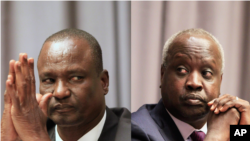East African bloc IGAD opened a new round of peace talks for South Sudan in Addis Ababa Thursday with a plea for the warring sides to be open to compromise as they work with mediators to end 20 months of conflict.
"Making peace or war are choices we can make," IGAD lead mediator Seyoum Mesfin said as he opened the latest round of talks.
"War has horrid consequences while peacemaking is equally, immensely difficult," the former Ethiopian foreign minister said. Seyoum said while it has been difficult, if not impossible, for IGAD to come up with a deal that both sides in South Sudan's conflict consider fair, "Compromise solutions are reachable."
IGAD deal
IGAD crafted a compromise agreement for South Sudan after the previous round of talks - supposed to be the last chance to reach agreement - ground to a halt in early March.
The IGAD compromise proposes giving President Salva Kiir’s government the lion's share of power in a transitional government, but hands a majority of the state parliamentary seats in the Great Upper Nile region to the main armed opposition movement, led by former vice president Riek Machar. Among other proposals is the creation of a new post of first vice president, which would be filled by Machar.
Both sides have rejected parts of the proposed deal, but have shown up in Addis Ababa to try to hammer out an agreement by an August 17 deadline set by an expanded mediation team, known as IGAD-Plus.
IGAD-Plus includes the United States and its troika partners, the United Kingdom and Norway; the European Union, the United Nations, the African Union, five African nations, and China.
Fighting words
The government and rebel negotiators’ opening statements at the new round of talks did little to raise hopes that the path to a final peace deal will be a smooth one.
The government's lead negotiator, Nhial Deng Nhial, said the government was "definitely not prepared for... IGAD's abrupt and ill-conceived decision that control of the three states of Jonglei, Unity and Upper Nile be handed over to the SPLM-in-Opposition on a silver platter."
"These are states that the armed rebellion desperately seeks to take over militarily, and in the single-mindedness of this objective, the rebellion has cost us the loss of many lives among both the civilian population and military on both sides," he said.
"So, for those who have made immense sacrifices in order to keep the SPLM-in-Opposition at bay in those states, it is utterly incomprehensible that they are now being asked to cede control of those areas to Riek Machar," Nhial said.
The lead negotiator for Machar's opposition group, Taban Deng Gai, fired back that President Kiir’s government is illegitimate and "cannot continue to claim that it deserves a special advantage in power-sharing."
"This illegitimate government continues to inflict suffering on the people of South Sudan," he said, accusing the government of blocking aid shipments to the Greater Upper Nile region, and of committing "heinous crimes" in Juba and other parts of South Sudan.
Stressing that it is important for all stakeholders in South Sudan to be part of the peace process, Deng also said the government has "prevented members of other political parties from coming to these peace talks. This does not bode well for the sustainable peace we are here to discuss."
Opposition leader Lam Akol told South Sudan in Focus on Thursday that police at Juba International Airport prevented him and six other opposition politicians from travelling to Addis Ababa for the talks.
In addition to the government and SPLM-in-Opposition, representatives of former political detainees, civil society and women’s groups, and religious leaders from South Sudan are attending the talks.
No official death toll has ever been released during the conflict, but observers have estimated that tens of thousands have been killed. It is known that more than 2 million people have been forced from their homes by the fighting; nearly 5 million are expected to face extreme hunger unless the conflict is brought to an end; and South Sudan's oil-dependent economy has all but collapsed as production, which is centered in the Greater Upper Nile region, has plummeted.




